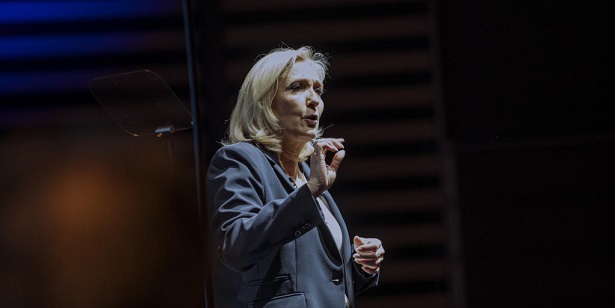According to projections, Marine Le Pen reaches run-off in French election for second time
A series of smart bets and the candidacy of Eric Zemmour explain her strong showing. The other far-right candidate made her appear almost moderate despite her political program going against fundamental democratic and republican principles.

Far-right candidate Marine Le Pen, 53, has qualified for the run-off of the presidential election for the second time in a row with 23% of the vote, according to projections by Ipsos-Sopra-Steria for France Télévisions, Radio France, France 24-RFI-MCD, Public Sénat-LCP Assemblée nationale and Le Parisien-Aujourd’hui en France.
The Rassemblement National candidate is now in the position to reap the fruits of a convincing campaign, even if the second round remains an uphill battle as she faces incumbent president Emmanuel Macron, who received 27.6% of the vote.

Three main factors explain her strong showing. She made a smart bet when she decided last fall to focus her campaign on the issue of purchasing power, which was the underlaying motivation of the Yellow Vests movement in 2018. The war in Ukraine and the rise of gasoline prices put it in the forefront during the last weeks of the campaign.
She also benefited greatly from the candidacy of another far-right hopeful, Eric Zemmour (Reconquête !). With his xenophobic outrages, Mr. Zemmour made her appear almost moderate. The former pundit also paved the way for the transfer of votes from the traditional right, which was initially reluctant to support her. Finally, there’s Emmanuel Macron’s decision to enter the race at the last minute, partly to keep his protective status as president, but also because the Russian invasion of Ukraine deprived him of the time needed to run a real campaign.

Marine Le Pen, who lives on her own after two unsuccessful marriages, has spent her entire life in politics, first in the shadow of her father Jean-Marie, who had long been the standard bearer of the French far-right. He had been convicted many times for provocation to hatred, discrimination, racial violence and public insults. In 1976, a bomb attack claimed by an unknown anti-fascist group destroyed the family apartment in Paris, without causing casualties. Jean-Marie Le Pen ran five times for the presidential election and even qualified once for the second round in 2002, only to suffer a stinging defeat (18% of the vote) at the hands of Jacques Chirac.
When Marine Le Pen took over in 2011, she instantly broke with the excesses and provocations that had defined her father’s reputation. Contrary to him, she showed from the start that she was seeking power. She worked relentlessly to rehabilitate her brand. After a strong showing in the first round of the 2012 presidential election (17.9% of the vote), she qualified for the second round in 2017 with 21.3% of the vote. She was defeated soundly (34% of the vote) by Emmanuel Macron, but by a less humiliating margin than her father 15 years earlier.
Instead of changing her strategy, she decided to double down. She spent a lot of time softening her tone and even walking back from measures deemed unsustainable on the European Union and euro currency, retirement age and dual citizenship. She nevertheless sticks to the core of her radical and sometimes illiberal platform, starting with a referendum on immigration which would de facto rewrite several articles of the Fifth Republic’s Constitution.
Her strategy opened a political space for former Le Figaro pundit Eric Zemmour, who described her as a “socialist.” She did have to deal with the departure of several figures who decided to rally behind Mr. Zemmour, including her niece Marion Maréchal-Le Pen (a rising star for the ultra-conservative branch of the far-right). But Marine Le Pen has been able to withstand the pressure and retain her electorate, which is overwhelmingly made up of those who were long ago the backbone of the left-wing: blue collar workers, less educated youth and lower income classes.
d’aprés le Monde



التعليقات مغلقة.